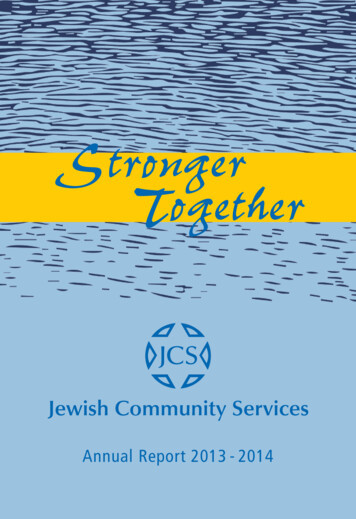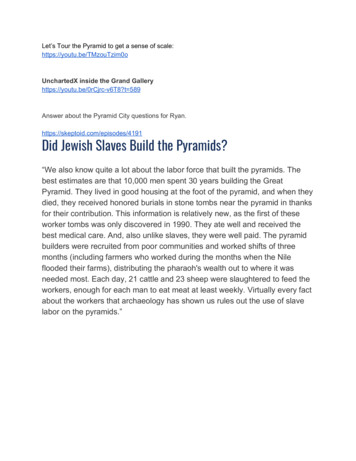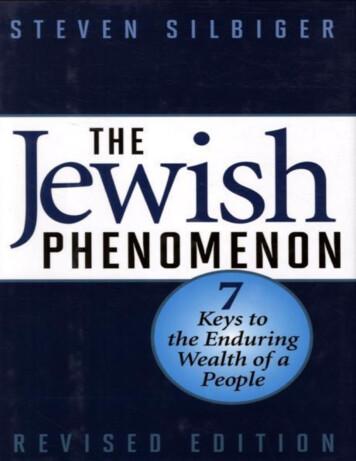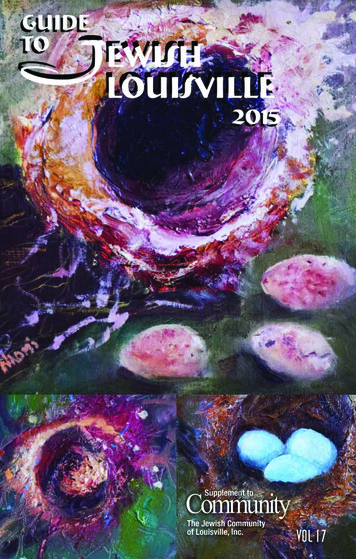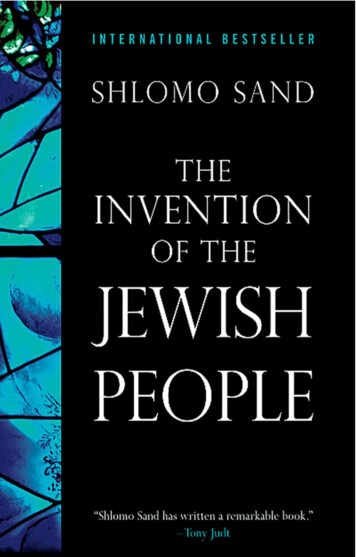
Transcription
The Invention of the Jewish People
The Invention of theJewish PeopleShlomo SandTranslated by Yael LotanVERSOLondon New York
English edition published by Verso 2009 Verso 2009Translation Yael LotanFirst published asMatai ve'ekh humtza ha'am hayehudi?[When and How Was the Jewish People Invented?] Resling 2008All rights reservedThe moral rights of the author have been asserted1 3 5 7 9 10 8 6 4 2VersoUK: 6 Meard Street, London W1F 0EGUS: 20 Jay Street, Suite 1010, Brooklyn, NY 11201www.versobooks.comVerso is the imprint of New Left BooksISBN-13: 978-1-84467-422-0British Library Cataloguing in Publication DataA catalogue record for this book is available from the British LibraryLibrary of Congress Cataloging-in-Publication DataA catalog record for this book is available from the Library of CongressTypeset by Hewer Text UK Ltd, EdinburghPrinted in the US by Maple Vail
To the memory of the refugees who reached this soiland those who were forced to leave it.
ContentsPREFACE TO THE ENGLISH-LANGUAGE EDITIONINTRODUCTION: BURDENS OF MEMORYIdentity in Movement1Constructed Memories141.MAKING NATIONS: SOVEREIGNTY AND EQUALITYLexicon: "People" and Ethnos 24The Nation: Boundaries and Definitions31From Ideology to Identity 39From Ethnic Myth to Civil Imaginary45The Intellectual as the Nations "Prince" 542.MYTHISTORY: IN THE BEGINNING,GOD CREATED THE PEOPLEThe Early Shaping of Jewish History 65The Old Testament as Mythistory71Race and Nation78A Historians' Dispute81A Protonationalist View from the East 87An Ethnicist Stage in the West 95The First Steps of Historiography in Zion 100Politics and Archaeology 107The Earth Rebels against Mythistory 115The Bible as Metaphor 1233.THE INVENTION OF THE EXILE:PROSELYTISM AND CONVERSIONThe "People" Exiled in 70 CE 130Exile without Expulsion—History in the Twilight Zone136Against Its Will, the People Emigrate from the Homeland 143"All Nations Shall Flow Unto It" 150The Hasmoneans Impose Judaism on Their Neighbors 154ÎX12364129
viiiFrom The Hellenistic Sphere to Mesopotamian Territory 161Judaizing in the Shadow of Rome 166How Rabbinical Judaism Viewed Proselytizing173The Sad Fate of the Judeans 178Remembering and Forgetting the "People of the Land"1824.5.REALMS OF SILENCE:IN SEARCH OF LOST (JEWISH) TIMEArabia Felix: The Proselytized Kingdom of Himyar 192Phoenicians and Berbers: The Mysterious Queen KahinaJewish Kagans? A Strange Empire Rises in the East 210Khazars and Judaism: A Long Love Affair?218Modern Research Explores the Khazar Past 230The Enigma: The Origin of Eastern Europe's Jews 238190199THE DISTINCTION: IDENTITY POLITICS IN ISRAELZionism and Heredity256The Scientific Puppet and the Racist Hunchback272Founding an Ethnos State 280"Jewish and Democratic"—An Oxymoron?292Ethnocracy in the Age of Globalization307250ACKNOWLEDGMENTS314INDEX315
Preface to the English-Language EditionThis book was originally written in Hebrew. My mother tongue is actuallyYiddish, but Hebrew has remained the language of my imagination, probably ofmy dreams and certainly of my writing. I chose to publish the book in Israelbecause initially my intended readers were Israelis, both those who see themselves as Jews and those who are defined as Arabs. My reason was simpleenough: I live in Tel Aviv, where I teach history.When the book first appeared in early 2008, its reception was somewhatodd. The electronic media were intensely curious, and I was invited to takepart in many television and radio programs. Journalists, too, turned theirattention to my study, mostly in a favorable way. By contrast, representativesof the "authorized" body of historians fell on the book with academic fury, andexcitable bloggers depicted me as an enemy of the people. Perhaps it was thiscontrast that prompted the readers to indulge me—the book stayed on thebestseller list for nineteen weeks.To understand this development, you have to take a clear-eyed lookat Israel and forgo any bias for or against. I live in a rather strange society.As the closing chapter of the book shows—to the annoyance of many bookreviewers—Israel cannot be described as a democratic state while it sees itselfas the state of the "Jewish people," rather than as a body representing all thecitizens within its recognized boundaries (not including the occupiedterritories). The spirit of Israel's laws indicates that, at the start of the twentyfirst century, the state's objective is to serve Jews rather than Israelis, and toprovide the best conditions for the supposed descendants of this ethnos ratherthan for all the citizens who live in it and speak its language. In fact, anyoneborn to a Jewish mother may have the best of both worlds—being free to livein London or in New York, confident that the State of Israel is theirs, even ifthey do not wish to live under its sovereignty. Yet anyone who did not emergefrom Jewish loins and who lives in Jaffa or in Nazareth will feel that the state inwhich they were born will never be theirs.Yet there is a rare kind of liberal pluralism in Israel, which weakens in timesof war but functions quite well in peacetime. So far it has been possible inIsrael to express a range of political opinions at literary events, to have Arabparties take part in parliamentary elections (provided they do not question
XPREFACE TO THE ENGLISH-LANGUAGE EDITIONthe Jewish nature of the state), and to criticize the elected authorities. Certainliberal freedoms—such as freedom of the press, of expression and of association—have been protected, and the public arena is both variegated and secure.That is why it was possible to publish this book, and why its reception in 2008was lively and aroused genuine debate.Furthermore, the tight grip of the national myths has long been loosened.A younger generation of journalists and critics no longer echoes its parents'collectivist ethos, and searches for the social models cultivated in Londonand New York. Globalization has sunk its aggressive talons into the culturalarenas even of Israel and has, in the process, undermined the legends thatnurtured the "builders' generation." An intellectual current known as postZionism is now found, though marginally, in various academic institutions,and has produced unfamiliar pictures of the past. Sociologists, archaeologists,geographers, political scientists, philologists, and even filmmakers have beenchallenging the fundamental terms of the dominant nationalism.But this stream of information and insights has not reached theplateau on which resides a certain discipline, called "The History of theIsraelite People" in Hebrew academies. These institutions have no departments of history as such, but rather departments of general history—such asthe one I belong to—and separate departments of Jewish (Israelite) history. Itgoes without saying that my harshest critics come from the latter. Aside fromrioting minor errors, they chiefly complained that I had no business discussingJewish historiography because my area of expertise is Western Europe. Suchcriticism was not leveled against other general historians who tackled Jewishhistory, provided they did not deviate from the dominant thinking. "TheJewish people," "the ancestral land," "exile," "diaspora," "aliyah," "Eretz Israel,""land of redemption" and so forth are key terms in all reconstructions withinIsrael of the national past, and the refusal to employ them is seen as heretical.I was aware of all this before I began writing this book. I expected myattackers to claim that I lacked a proper knowledge of Jewish history, did notunderstand the historical uniqueness of the Jewish people, was blind to itsbiblical origin, and denied its eternal unity. But it seemed to me that to spendmy life at Tel Aviv University amid its vast collection of volumes and documentsabout Jewish history without taking time to read and tackle them would havebeen a betrayal of my profession. Certainly it is pleasant, as a well-establishedprofessor, to travel to France and the United States to gather material aboutWestern culture, enjoying the power and tranquility of academe. But as a historian taking part in shaping the collective memory of the society I live in, I felt itwas my duty to contribute directly to the most sensitive aspects of this task.
PREFACE TO THE ENGLISH-LANGUAGE EDITIONxiAdmittedly, the disparity between what my research suggested about thehistory of the Jewish people and the way that history is commonly understood—not only within Israel but in the larger world—shocked me as much asit shocked my readers. Generally speaking, educational systems teach you tobegin writing after you have finished your thinking—meaning that you shouldknow your conclusion before you start writing (that was how I obtainedmy doctoral degree). But now I found myself being shaken repeatedly as Iworked on the composition. The moment I began to apply the methods ofErnest Gellner, Benedict Anderson and others, who instigated a conceptualrevolution in the field of national history, the materials I encountered in myresearch were illuminated by insights that led me in unexpected directions. Ishould emphasize that I encountered scarcely any new findings—almost allsuch material had previously been uncovered by Zionist and Israeli historiographers. The difference is that some elements had not been given sufficientattention, others were immediately swept under the historiographers' rug, andstill others were "forgotten" because they did not fit the ideological needs ofthe evolving national identity. What is so amazing is that much of the information cited in this book has always been known inside the limited circles ofprofessional research, but invariably got lost en route to the arena of public andeducational memory. My task was to organize the historical information in anew way, to dust off the old documents and continually reexamine them. Theconclusions to which they led me created a radically different narrative fromthe one I had been taught in my youth.Unfortunately, few of my colleagues—the teachers of history in Israel—feel it their duty to undertake the dangerous pedagogical mission of exposingconventional lies about the past. I could not have gone on living in Israelwithout writing this book. I don't think books can change the world, but whenthe world begins to change, it searches for different books. I may be naive, butit is my hope that the present work will be one of them.Tel Aviv, 2009
Introduction: Burdens of MemoryA Nation . is a group of persons united by a common error about their ancestryand a common dislike of their neighbors.—Karl Deutsch, Nationality and Its Alternatives, 1969I do not think I could have written the book on nationalism which I did write,were I not capable of crying, with the help of a little alcohol, over folk songs.—Ernest Gellner, "Reply to Critics," 1996This book is a work of history. Nonetheless, it will open with a number ofpersonal stories that, like all biographical writing, required a liberal amountof imagination to give them life. To begin like this is less strange than readersmay at first imagine. It is no secret that scholarly research is often motivated bypersonal experiences. These experiences tend to be hidden beneath layers oftheory; here some are proffered at the outset. They will serve the author as thelaunch pad in his passage toward historical truth, an ideal destination that, heis aware, no one ever truly reaches.Personal memory is untrustworthy—we do not know the color of the ink withwhich it was written—and thus one should view the depiction of the followingencounters as inexact and partly fictitious, though no more so than any othertype of biographical writing. As for their possibly troublesome connection withthe central thesis of this book, readers will discover it as they proceed. True, theirtone is sometimes ironic, even melancholic. But irony and melancholy have theiruses, and might jointly be suitable attire for a critical work that seeks to isolate thehistorical roots and changing nature of identity politics in IsraelIDENTITY IN MOVEMENTThe First Story—Two Immigrant GrandfathersHis name was Shulek. Later, in Israel, he was called Shaul. He was born inLodz, Poland, in 1910. At the end of the First World War his father died of theSpanish flu, and his mother went to work as a laborer in a textile plant nearthe city. Two of her three children were put up for adoption with the help ofthe local Jewish community; only Shulek, the youngest, remained at home.He attended a heder for a few years, but his mother's straitened circumstancesforced him out into the streets at an early age, and he began to do various jobs
2THE INVENTION OF THE JEWISH PEOPLEassociated with the processing of textiles. That's how it was in Lodz, Poland'scenter of textile production.The young man shed his parents' ancient faith for fairly ordinary reasons.As his mother had been impoverished by his father's death, the local synagogue ordered her to sit in the back rows of the congregation. Hierarchy ruledin this traditional society. The reduction of financial capital almost always ledto a rapid reduction in symbolic capital, and so the mother's distance fromrespectable social status was mirrored in her distance from the holy Torah.Her son, carried along by the momentum of exclusion, found himself cast outof the house of prayer. Loss of faith among the young in the Jewish quarters ofmajor cities was becoming widespread. Overnight young Shulek, too, foundhimself without a home and without a faith.But not for long. He joined the Communist Party, as was the fashion, whichbrought him in line with the cultural and linguistic majority of Polish society.Soon Shulek became a revolutionary activist. The socialist vision filled his imagination and strengthened his spirit, prompting him to read and think in spiteof the demanding work he did for a living. The party became a haven. Beforelong, however, this warm and lively shelter also g
Yiddish, but Hebrew has remained the language of my imagination, probably of my dreams and certainly of my writing. I chose to publish the book in Israel because initially my intended readers were Israelis, both those who see them selves as Jews and those who are defined as Arabs. My reason was simple enough: I live in Tel Aviv, where I teach history. When the book first appeared in early .
